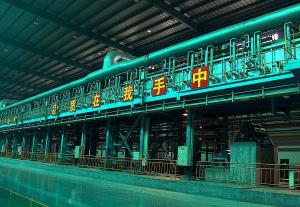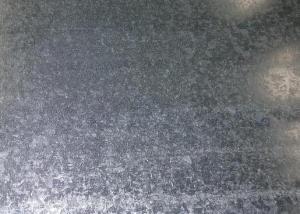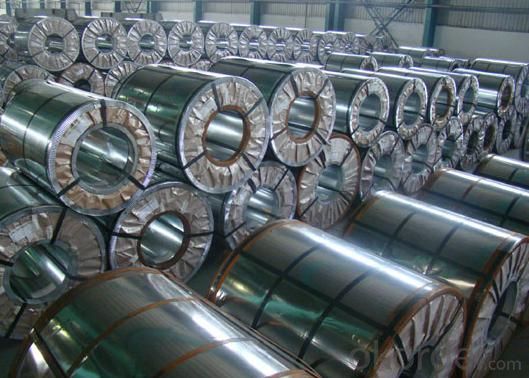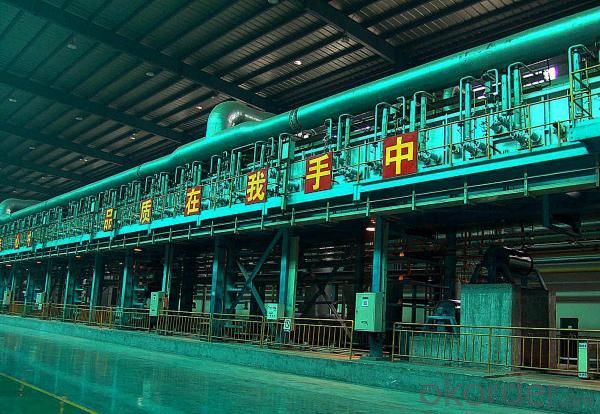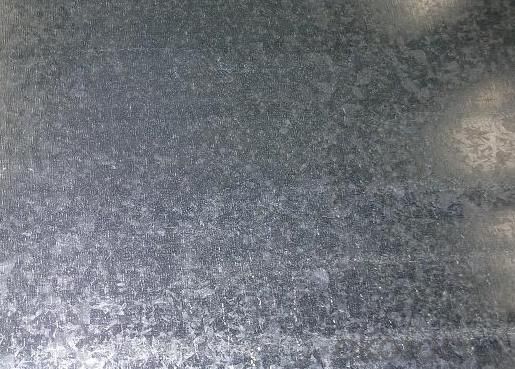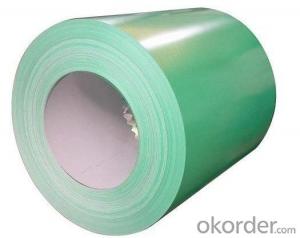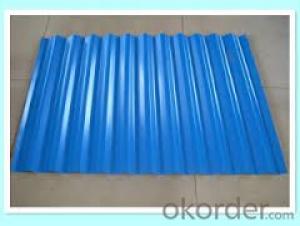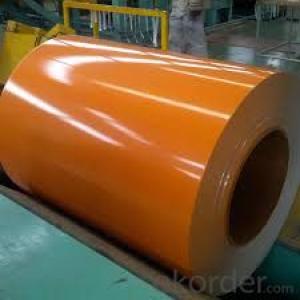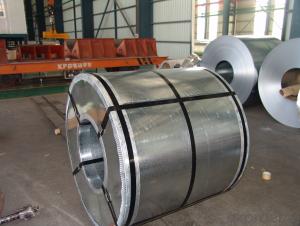Best Quality for Hot Dip Galvanized Steel Coil-Minimum Spangle
- Loading Port:
- China Main Port
- Payment Terms:
- TT or LC
- Min Order Qty:
- 50mt m.t.
- Supply Capability:
- 5000 tons per month m.t./month
OKorder Service Pledge
OKorder Financial Service
You Might Also Like
General Information of Hot Dip Galvanized Steel Coil
Hot-dip galvanized steel coils are available with a pure zinc coating through the hot-dip galvanizing process. It offers the economy, strength and formability of steel combined with the corrosion resistance of zinc. The hot-dip process is the process by which steel gets coated in layers of zinc to protect against rust. It is especially useful for countless outdoor and industrial applications.
Specification of Hot Dip Galvanized Steel Coil:
1. Thickness: 0.15-1.2mm
2. Width: 800mm-1250mm
3. Internal Diameter: 508mm/610mm
4. Coil Weight: 3-12MT
5. Quality: commercial and structural quality
6. Surface Treatment: regular & minimum spangle, zero spangle, oiled & dry , chromated , non-skin pass ,skin pass
7. Standard: JIS G 3302, ASTM A 653M, EN 10327
8. Steel Grade: SGCC, CS, FS, SS, LFQ, DX51D+Z , S280GD
Technical Data of Hot Dip Galvanized Steel Coil
Chemical Composition | C | Si | Mn | P | S |
0.04-0.06% | 0.01-0.03% | 0.18-0.22% | 0.014-0.016% | 0.006%-0.009% |
Technical Data | |
Yield Strength | (Mpa) 280-320 |
Tensile Strength | (Mpa) 340-390 |
Elongation | 20%-30% |
Out-of-square | not exceed 1% Flatness |
Bow | 15mmmax |
Edge Wave | 9mmmax |
Centre Buckle | 8mmmax |
Bending At 180 Degree | No crack, purling and fraction |
Application of Hot Dip Galvanized Steel Coil
It can be widely used in transportation, light industry, civil usage and farming. It is also the perfect building material in construction for making roofing tile, steel profiles for wall partition, T-bar, studs, fireproof door, air conditioning duct and home appliance.
Package of Hot Dip Galvanized Steel Coil
Full wrapped with anti-damped paper inside, iron sheet wrapped outside, and bundled by iron strips
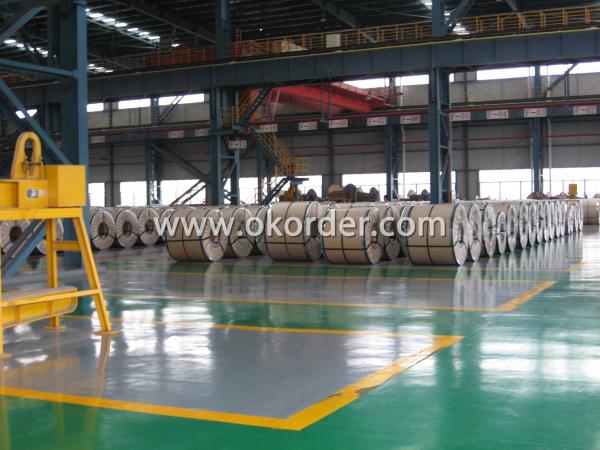
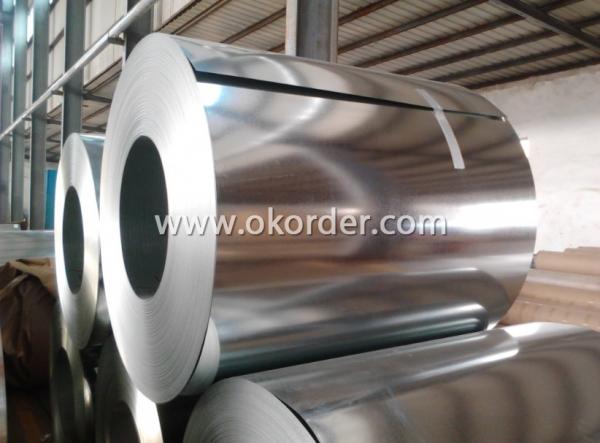
- Q: How are steel coils used in the production of metal enclosures?
- Steel coils are widely used in the production of metal enclosures due to their versatility and strength. These coils, which are typically made from high-quality steel, serve as the primary raw material for manufacturing metal enclosures. Firstly, the steel coils are unrolled and flattened to the desired thickness using specialized machinery. This process ensures that the coils are in a suitable form for further processing. The flattened steel is then cut into specific sizes and shapes, depending on the design requirements for the metal enclosure. Next, the cut steel pieces are formed into the desired shape using various techniques such as bending, folding, and welding. These processes allow the steel to be molded into the required dimensions and structure of the metal enclosure. The inherent strength and durability of the steel coils ensure that the final product is sturdy and can withstand external forces or impacts. Additionally, steel coils can be coated with protective layers such as galvanization or powder coating to enhance their resistance to corrosion, rust, or other environmental factors. This coating helps to prolong the lifespan of the metal enclosure and maintain its aesthetic appeal. Moreover, the use of steel coils in the production of metal enclosures allows for customization and flexibility. The coils can be easily manipulated to create complex shapes or designs, enabling manufacturers to cater to specific customer requirements. This adaptability makes steel coils a preferred choice in industries such as automotive, electronics, and construction, where metal enclosures are widely used. In summary, steel coils play a crucial role in the production of metal enclosures by providing a strong and versatile raw material. These coils are transformed into the desired shape and size, ensuring the durability and functionality of the enclosures. With their customizable nature and protective coatings, steel coils offer a cost-effective solution for manufacturing high-quality metal enclosures.
- Q: What are the common methods of packaging steel coils for transportation?
- The common methods of packaging steel coils for transportation include strapping, wrapping, and using wooden or steel cradles. Strapping involves securing the coils with metal or polyester bands, while wrapping involves using stretch film or shrink wrap to protect the coils from moisture and damage. Wooden or steel cradles are used to stack and secure multiple coils together, ensuring stability during transportation.
- Q: What are the different methods of cutting steel coils?
- There are several methods of cutting steel coils, including shearing, slitting, laser cutting, and plasma cutting. Shearing involves using a straight blade to cut through the coil, while slitting involves multiple circular blades that create narrower strips. Laser cutting uses a high-powered laser beam to melt and vaporize the steel, resulting in precise cuts. Plasma cutting uses a high-velocity jet of ionized gas to melt and blow away the steel, allowing for fast and accurate cuts.
- Q: The guy at this one pawn shop told me that stainless steel is better because it is just as strong and will not rust. The guy at the other pawn shop said that you need high carbon steel for a good sword because stainless steel breaks easily and that damascis is the best kind of steel for swords.
- You are gonna want carbon steel. Most real swords are always made from carbon steel. The vast majority of cheap swords being sold online are made from stainless steel. While stainless steel is a great choice for knives, it starts becoming very brittle on anything longer than 12? and is NOT a suitable material for a functional sword, no matter what some marketers might claim?. Stainless steel when it comes to a functioning weapon, is a joke. It's not made to cut and it's not made to last.
- Q: I asked a question last week about stainless steel and got some great answers. I combed all over the internet to try to figure this one out but could not find anything. What resists bending better: chrome vanadium steel (i.e. a steel commonly used to make tools) or stainless steel 304. My guess would be the chrome vanadium alloy but thats just a guess. Which on resist's bending better and by how much (#'s please :-)). Also, if anyone knows if chrome vanadium steel is cheaper than stainless steel 304 that would be awesome? I can't find a price per pound on chrome vanadium steel anywhere! Please help. Thanks in advance-Josh
- Fill the pot up w/cold water to cover the burned on rice. Bring it up to a boil. Do it again w/some high powered soap in the mix. This time let the water sit in the pan until its luke warm, dump it out and scrub it up w/the plastic scouring pad. You should be all set.
- Q: How are steel coils used in the production of electrical relays?
- Steel coils are a crucial component in the production of electrical relays as they are used to create a magnetic field. When an electrical current passes through the coil, the magnetic field is generated, which then attracts or repels a movable contact, allowing the relay to switch on or off an electrical circuit. Hence, steel coils play a vital role in the functioning of electrical relays by facilitating the control of current flow.
- Q: What processes and materials are used in the production of chrome steel
- well, save up some more $$. I wouldnt feel safe on a $120 mountain bike. My advice would be to invest in something that's a little more money. Also, why do you want a steel frame? Aluminum frames today are made from 7005 alloy, and stack up very well compared to the durability of steel. Plus, they wiegh alot less. Nowadays, youll only find steel on a cheap walmart bike, ir a top notch downhill bike made for extream offf road conditions.
- Q: melting point, as compare to stainless steel
- Be *real cautious* using HCL round stainless. A lowering acid like HCL will wreck down the oxide layer on the stainless, and corrosion will proceed. So far as i do know, there is not any scale down level at which HCL will not attack the skin oxide, however at very low concentrations maybe somewhat rust/pitting/corrosion is not going to be a main issue. Oxidizing acids like nitric, and to a couple measure sulfuric, will passivate stainless under the right conditions. But on simple, mild steels, corrosion will proceed to form FeCl and FeSO4 corrosion merchandise. The corrosion will haven't any outcomes on tensile, hardness or affect until ample fabric has been eliminated via corrosion to make a measurable change. Hydrogen embrittlement is a likelihood if there's constant anxiety, and hydrogen is advanced in corrosion. Whether or not it is a challenge would rely on the drawback.
- Q: Please explain why steel is denser than wood.
- Steel is basically a mixture (not the compound) of iron and carbon. Iron, by itself is an element and so is carbon. The atoms of Iron are larger in size compared to carbon. All the atoms of all the elements, smaller or larger, are spherical. If naturally a solid, the atoms of all such elements have voids as their atoms are closely packed. You can imagine a basket of oranges; you could see that void or empty space (which I am speaking about) between four or more of the oranges put together. Now, when heated to more than about 1500 degrees celcius, Iron melts and atoms in molten form increase space between themselves. Raising the teperature to 1800 degree celcius, carbon is mixed with iron. At this stage it causes the spherical carbon atoms to fill in the spaces present amongst the spherical atoms of the iron. On cooling, already dense iron becomes denser because no space is left there between its atoms. This denser form of iron + carbon has become steel in which carbon is not more than 3 to 4% of the total volume. Wood is nothing but a fallen and dried tree's part. When green and alive, tree's stem and branches have pores in there texture, which are fillled with water and other biological fluids necessary for the life of the plant. When dried all the fluids, especially water gets evaporated. and the pore are empty now. The term Density, means mass divided by volume (kg / cubic meters). Iron + Carbon (the steel) so tightly packed and Iron having very high atomic weight is surely denser than wood with just carbon and a few other elements with no significant role to play in the mass calculation; particularly if their are empty pore spaces filled with air only. Imagine the mass (which common people mistakingly call the weight) in kilograms of a peice of steel with dimensions of 1 meter cube and imagine the same for the dried wood. What do you think---which one is denser?
- Q: How are steel coils used in the production of solar panels?
- Steel coils are not directly used in the production of solar panels. However, steel is typically used in the manufacturing of the structural frames and mounting systems for solar panels. These frames and mounting systems provide support and stability to the solar panels, ensuring their proper installation and long-term durability.
1. Manufacturer Overview
| Location | Zhejiang, China |
| Year Established | 1999 |
| Annual Output Value | US$1 Million - US$2.5 Million |
| Main Markets | Europe; Africa; Mid East; Southeast Asia |
| Company Certifications | ISO9001;ISO14001 |
2. Manufacturer Certificates
| a) Certification Name | |
| Range | |
| Reference | |
| Validity Period |
3. Manufacturer Capability
| a) Trade Capacity | |
| Nearest Port | Shanghai Port |
| Export Percentage | 41% - 50% |
| No.of Employees in Trade Department | 50-80 |
| Language Spoken: | Chinese, English |
| b) Factory Information | |
| Factory Size: | Above 100,000 square meters |
| No. of Production Lines | 5 |
| Contract Manufacturing | OEM Service Offered |
| Product Price Range | Average |
Send your message to us
Best Quality for Hot Dip Galvanized Steel Coil-Minimum Spangle
- Loading Port:
- China Main Port
- Payment Terms:
- TT or LC
- Min Order Qty:
- 50mt m.t.
- Supply Capability:
- 5000 tons per month m.t./month
OKorder Service Pledge
OKorder Financial Service
Similar products
Hot products
Hot Searches
Related keywords
